Already a month in Iran. The visa had just been extended, we had just experienced our first sandstorm… In the category “surprise”, we could not do better. Actually yes: by opening our mailbox, the same day, we had fallen on the intriguing message of Saba “Meet the Bakhtiaris, the last nomads of Iran”. Stung by curiosity, we quickly answered her…
The Bakhtiaris
The Bakhtiaris, a nomadic tribe of several families, still roam the mountains of Zagros, Iran, as they migrate twice a year (spring and autumn) with their flocks of goats and sheep. Their way of life is today in great danger: political decisions, precariousness and difficulties push more and more nomads to settle down. Saba explains to us that one of the possibilities considered to help these nomads economically is the development of eco-tourism. Beyond the financial side (which should not replace the first source of income of these nomads, namely farming), we understand that the interest of the tourists brought to Bakhtiaris and their traditions would allow them to give them back trust; to make them more proud, more inclined to perpetuate this particular way of life… Despite our reluctance to be offered a tour against advertising for his agency, his arguments in favor of ethical and responsible tourism seem sincere… We end up accepting the proposed deal (after all, the experience is worth trying!): Make a photo and video report on the Bakhtiaris, in exchange for a tour organized 5 days.
D-day, “to the adventure!”
D-Day, 7 AM – Isfahan. We joined our guide and a group of tourists from Iran and elsewhere. Despite our tired faces, we soon got to know each other and shared our common enthusiasm for the upcoming adventurous trip. Together, we headed towards Zagros mountains, looking for our host family – fulfilled backpacks, trekking shoes on our feet, fully charged smartphones on hand. We had no clue what these days would be; we were only ready to live a rather unique migration experience with real nomads!
The first difficulty arose when we arrived at the meeting point. In the heart of the mountains, it was impossible for us to locate our family host or to establish contact with them … How to communicate here, with people whose the migration way seems just as unpredictable as weather conditions? Fortunately, after having talked to several nomads on the road, our guide was able to find them… a few kilometers upstream. At the bottom of a steep valley, near a river, the family of Ali Mola was waiting for us: when a place is good enough for animals to graze, Bakhtiaris nomads set up their camp and main tent – a black cloth that absorbs the heat of the sun, held by wooden stakes. Inside, there is at least one fireplace, for cooking and warming up during cool mountains evenings, as well as large carpets on which Bakhtiari people sleep and eat. More surprisingly, these nomads also build inside a stone-well, in which the mother puts newborn lambs and goats after milking their mothers at sunset. A simple but effective way to keep the weakest ones warm and safe.
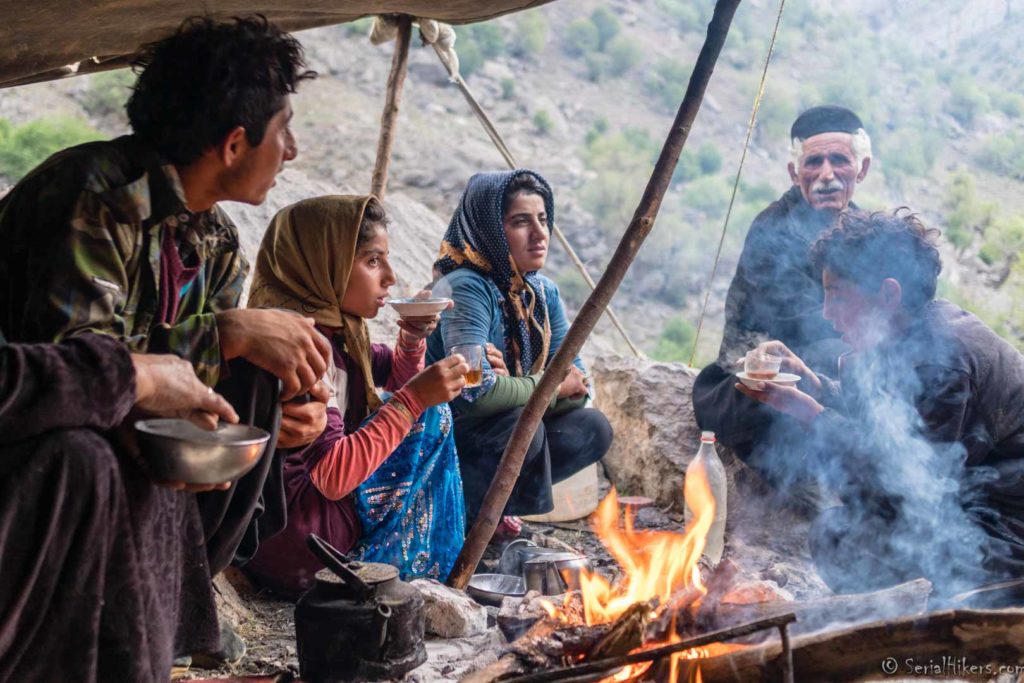
When we finally managed to set up our tents, the night just fell. Invited to have dinner with Ali Mola, his wife and five of his children, we headed to the main tent. On the menu, tonight: tea, rice and doogh for everyone! When we finished our plates, the mother went to milk her goats (whose fresh milk will be boiled and turned into yoghurt after a night of fermentation) while Ali Mola and his sons gathered around the small radio station, listening carefully to the weather forecast and organizing their respective shifts. Shifts? We didn’t have any guess about it when we arrived, but we realize very quickly that the hardest thing in a nomadic migration is not walking… but taking care of the animals. Because of the current meat price, thefts in the middle of the night have multiplied. Not to mention bear attacks which, we heard, have taken two goats the night before… Bakhtiaris’ nomads have had no choice but to equip themselves with guns: if an intruder comes a little too close to the herd, then he will receive a serious gunshot in calf areas (fire over the knee is prohibited)! The stories of murders, vendetta and thieves are working well within the Bakhtiari tribe – stories that men like to tell by the fireplace, holding a pipe…
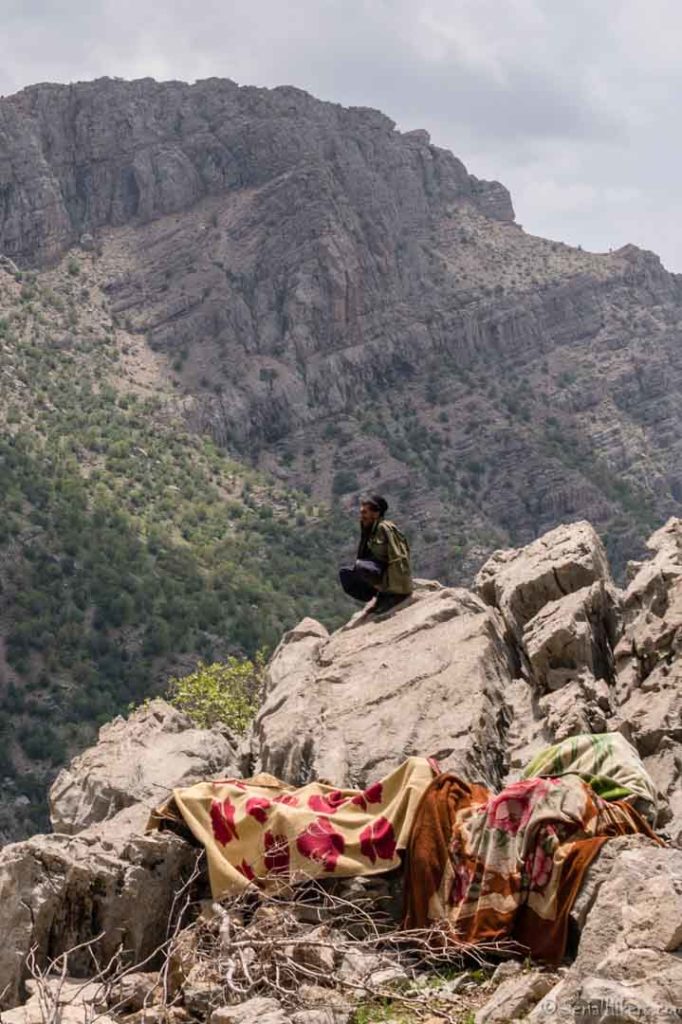
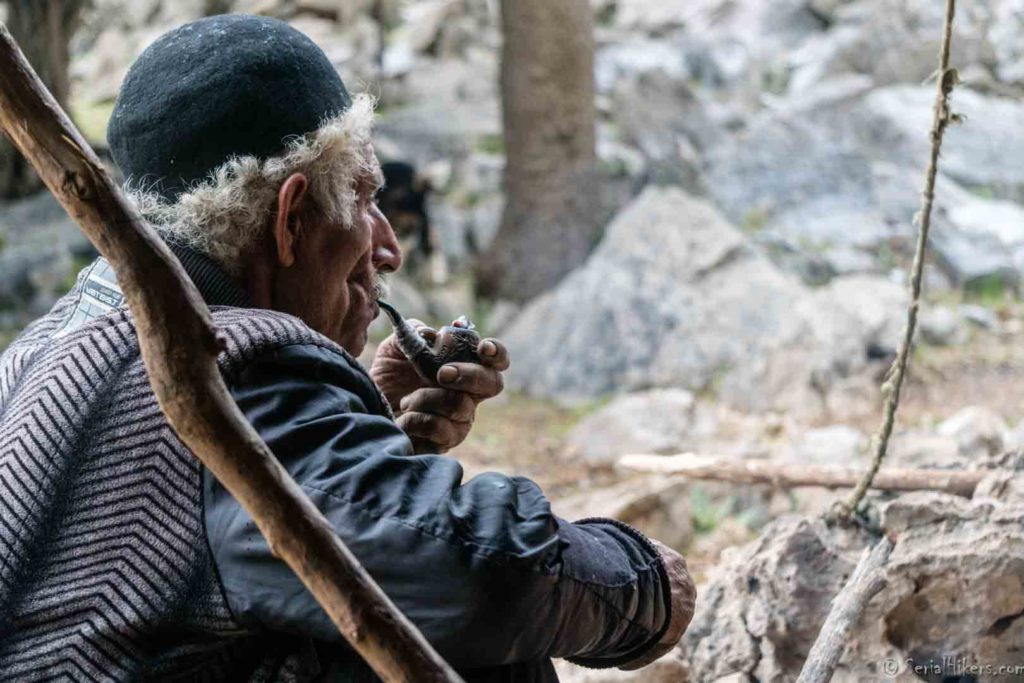
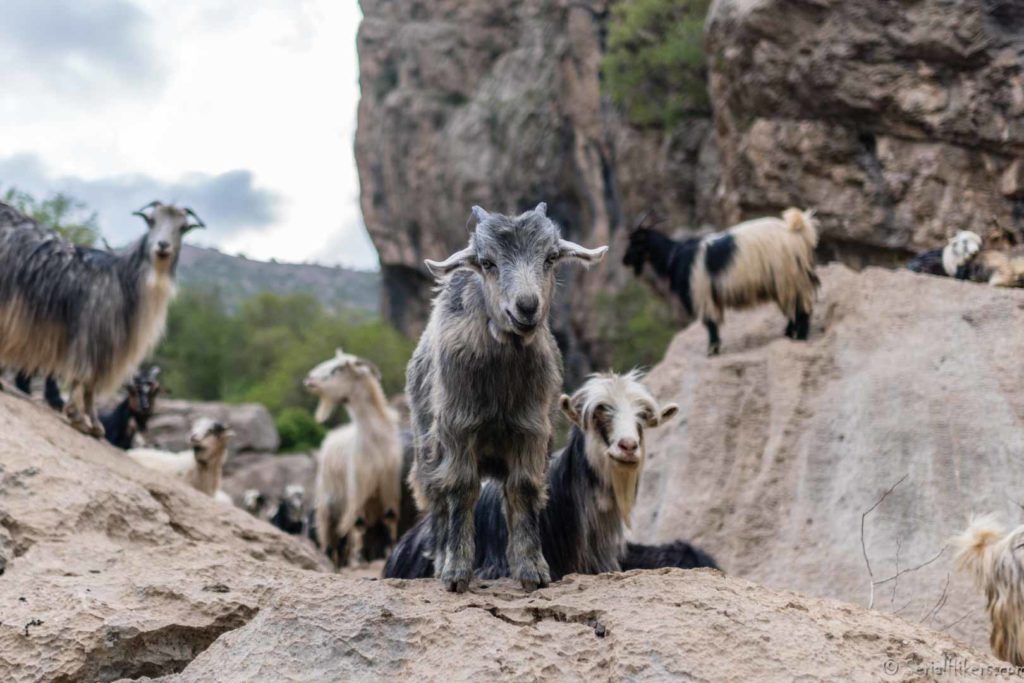
Day 2, “the council”
The storm of the first night set everyone up at 6am: the water flooded our tents; animals began to shudder with cold (despite the thick fur of Angora goats) and the dry wood collected for the fire was totally wet. We waited after the sun in the morning to warm up, dry all our stuff and decide for the future. While Ali Mola went to the local concile among other Bahktiari men to decide whether or not to migrate the next day (weather, lack of food, fatigue of animals…); the mother and her daughters began to make bread, an essential element of nomadic meals.
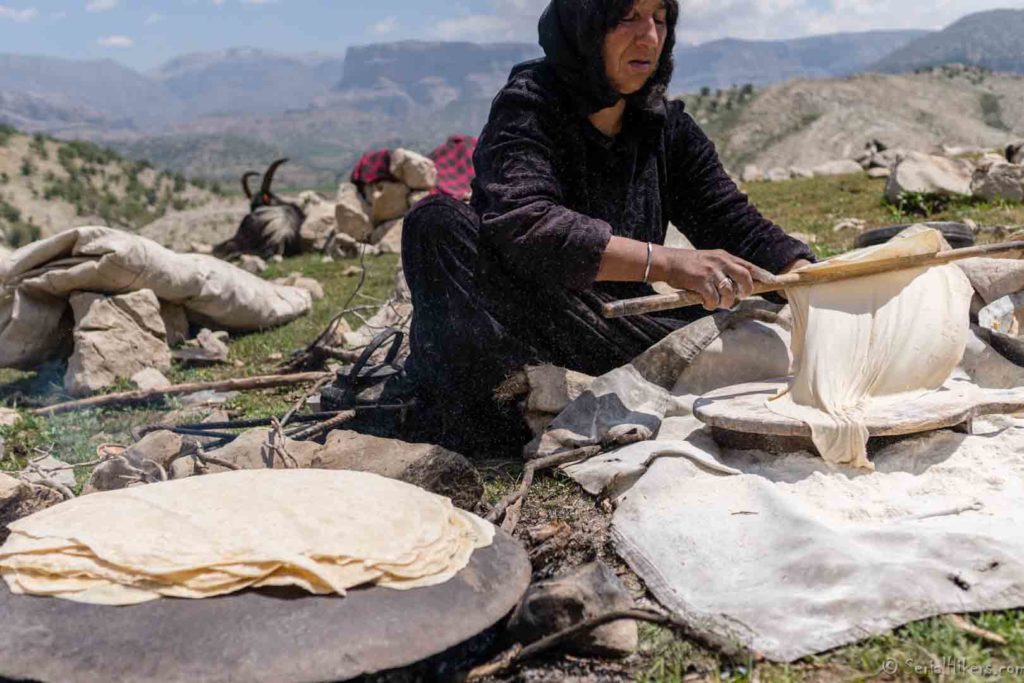
We watched them, fascinated, skillfully rolled out the dough while the first breads were cooked on a metallic dome above the fire. The mother, dressed in her long black dress and her veil revealing two strands of perfectly curly hair, may be discreet, she is indeed the pillar of the family: she cooks, sets up the tent, carries water, milks goats and regularly loads/unloads donkeys with heavy bags containing all the family’s belongings. Bahktiaris women, often uneducated, poor quality shoes at feet, have no choice but to follow their men (husbands, sons, fathers) in all circumstances. Speaking of men and decisions, the Council of the day has just decided: tomorrow, we have to leave!
Day 3, “get acquainted”
Unfortunately, the persistent bad weather on the second day with nomads puts an end to any hope of walking – a curse for Ali Mola who, in more than 40 years of migration, has never experienced so much rain. We stayed under the tent, sitting around the fire, taking advantage of this moment of misfortune to question our hosts about their lifestyle, with the help of our guide. “Tell me Ali Mola, isn’t it too hard for your children? “No it isn’t, because they like to be in the nature, with animals. My eldest son went to Isfahan. He found neither work nor woman, and sat all the day in front of the television… ” He was interrupted by one of his young sons. Outside, under heavy rainfalls, a goat had just given birth. In his arms, half asleep, stood the newborn (a female!) which had to be warmed up… Ironically, Ali Mola served us at dinner meat skewers of a young male goat that he had sacrificed with a knife.
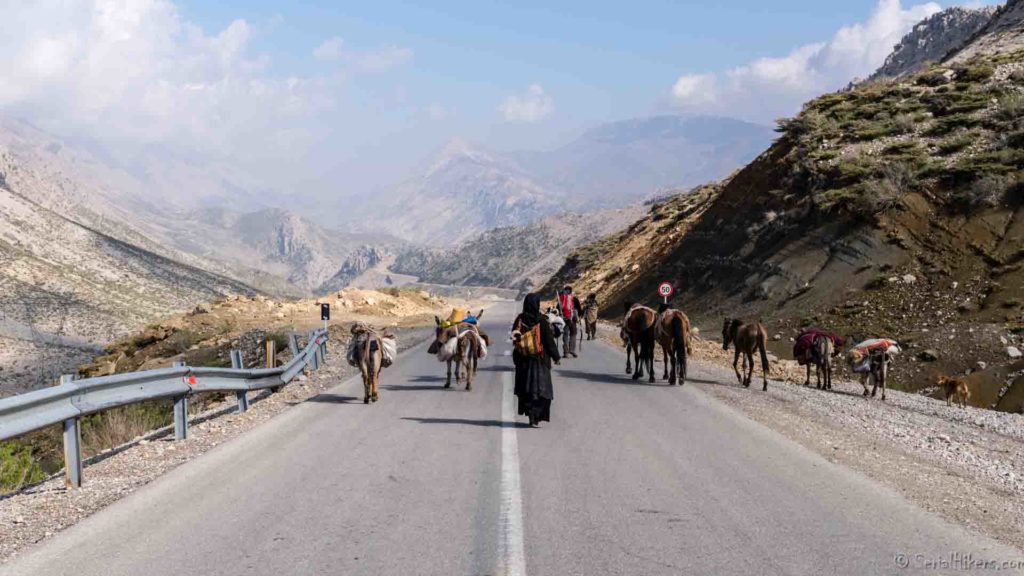
Day 4, “migration”
The next morning we were awakened very early – not because of bad weather but by the sound of hundreds of bells and bleatings surrounding our camp. During the night, some reckless animals had even tried to jump over our tents… Despite our tired-looking faces, we will not have a single time to complain: after swallowing a bowl of fresh yogurt and packing our stuff, we had to load donkeys and set off very quickly – leaving behind a field of waste, Bakhtiaris being absolutely unaware of the ecological damage caused… We try somehow to pick up cans, plastic bags and used batteries thrown here and there to drop them in the single container from the nearest village. In the processional order, men went first with goats and sheeps. Dressed in his striped vest, harem pants and black hat, wooden stick in one hand and gun in the other; Ali Mola will walk with his sons and flock the steep and stony slopes of Zagros mountains – paths that these animals with their hooves have no trouble climbing. The mother and her daughters set out afterwards; they will lead by foot or on horseback, on more suitable paths, the few donkeys carrying the heavy belongings and the newborn goats, too weak to accomplish this long walk. The eldest daughter will give the impulse, the steady speed of the walk. At the age of 19, with her rifle slung over her shoulder and her assertive personality, she has just been married. This migration will be the last with her parents: next fall, she will leave her family to join her husband.
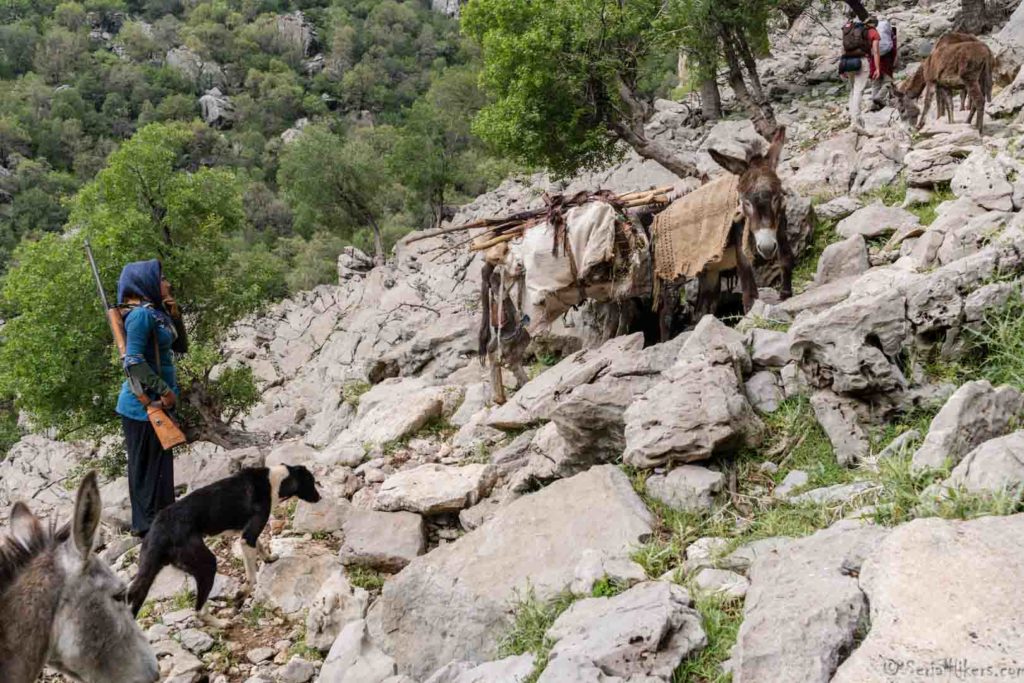
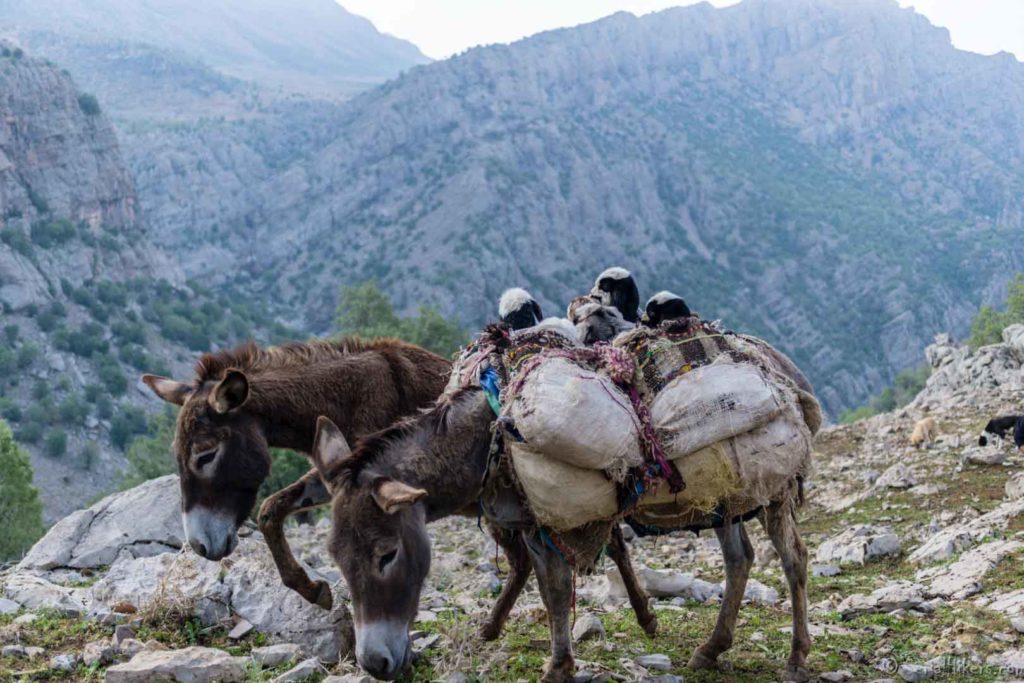
Not accustomed to such a speed, we will stay mostly behind, taking advantage of our last position to immortalize in pictures this incredible migration. The passage of the exceptional Zagros mountains under a radiant sun will make us almost forget the icy water of the Bozoft river, which was necessary to cross on foot, and the 15 kilometers walked until arrival. We will end this trying journey much better than we started it: after improvising a shower under a small waterfall, taking a more substantial meal by the fireside; we will enjoy a much quieter night, under a perfectly starry sky.
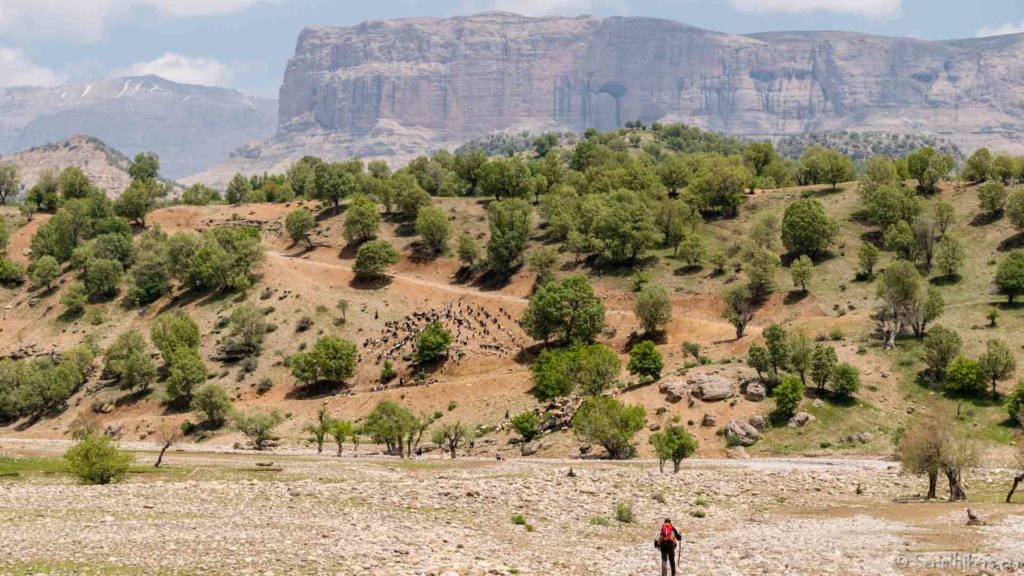
Day 5, “back to civilisation”
After a brief farewell, we let our host family disappear in the mountains, with only the echo sound of hooves, bells, whistles and animals sounds. It will take them a good ten or so extra days to reach their final destination. As for us, it will take us several hours of transport to reach the capital, and few days of rest to fully recover from this crazy adventure. One thing is certain: we will not soon forget about it!
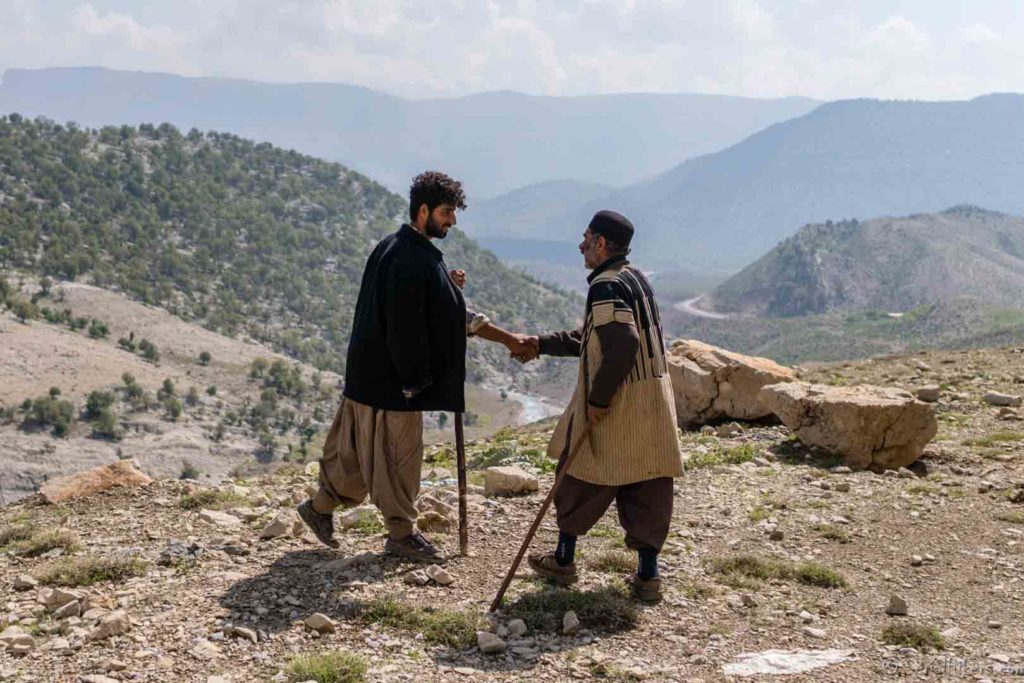
Contact: Persia Nomad tours agency
* Post written according to our personal experience *
I watch the videos every day. I have come ti love these kind, gentle people. I would like to know the grandmother’s name and age. She is amazing. The children are beautiful, as are their mothers. Please let us know the names and relations. Thank you for the wonderful documentary.
Beverly Mason